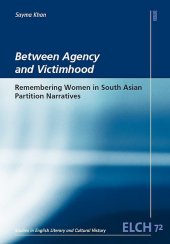 Neuerscheinungen 2017Stand: 2020-02-01 |
Schnellsuche
ISBN/Stichwort/Autor
|
Herderstraße 10
10625 Berlin
Tel.: 030 315 714 16
Fax 030 315 714 14
info@buchspektrum.de |

Sayma Khan
Between Agency and Victimhood
Remembering Women in South Asian Partition Narratives
Neuausg. 2017. 216 S. 2. 25.5 cm
Verlag/Jahr: WVT WISSENSCHAFTLICHER VERLAG TRIER 2017
ISBN: 3-86821-738-X (386821738X)
Neue ISBN: 978-3-86821-738-4 (9783868217384)
Preis und Lieferzeit: Bitte klicken
This study explores the nexus between the diverse modes and media of representing South Asian Partition - from non-literary material (legal treatises, political speeches, newspaper articles), to the literary medium of short stories and novels in Urdu and English spanning more than six decades - together with the emergence of women´s taking active roles in mediating Partition. The comparative approach, i.e. the analysis of Urdu and English-language Partition narratives in the book, contributes to an understanding of South Asian Partition literature as representative of multiple and heterogeneous Partition experiences. The book traces the impact of the historical event on the imagination of artists and the general public across and beyond individual cultures and nations through the medium of Urdu and English-language Partition literature.
CONTENTS
I. Introduction 1
II. (Trans)cultural memories of South Asian Partition 20
2.1. Concepts of (trans)cultural memory 20
2.2. Remembering South Asian Partition 26
2.2.1. Mediated memories of Partition 27
2.2.2. Transgenerational, gendered, and traumatic memories
of Partition 29
III. Narratological approaches towards the representation
of South Asian Partition 35
3.1. From narrative worlds towards world-making through narratives 37
3.2. Nexus between feminist theory and narratology 39
3.3. Gendered space, time, and narrative transmission in Partition fiction 41
IV. Oscillating between agency and victimhood: Indian women
during colonial rule, independence movement and partition 47
4.1. Colonial India: women as bearer of traditions
in need of social reforms 47
4.2. Independence movement: women as preservers of tradition
mobilized for nationalist purposes 55
4.2.1. Sarojini Naidu: advocating Hindu-Muslim unity 57
4.2.2. Gandhi: mobilizing women for the cause
of Indian independence 62
4.2.3. M.A. Jinnah: mobilizing Muslim women for the cause
of Pakistan 67
4.3. Partition: women´s bodies as cultural markers
turned into sites of violence 70
V. South Asian Partition Literature in Urdu 79
5.1. Victimization of the perpetrator: (trans.: "Cold Meat") 88
5.1.1. Revenge upon the perpetrator 90
5.1.2. The confession of a perpetrator 91
5.1.3. "Cold Meat" in legal trouble 93
5.2. A mother´s refusal to leave her ´roots´: (trans.: "Roots") 97
5.2.1. When India is operated upon 99
5.2.2. Amma: storekeeper of memories 101
5.3. Crossing the threshold of the house: (trans.: Inner Courtyard) 103
5.3.1. Kariman Bua: lamenting the forlorn past 105
5.3.2. Kusum: suffering social stigmatization 107
5.3.3. Aaliya: suffereing the burden of past memories 110
5.4. How many more Partitions? (trans.: Basti) 113
5.4.1. Zakir: caught between forgetting and remembering 117
5.4.2. Sabirah: the remembered one 121
VI. South Asian Partition Literature in English 125
6.1. Sikh martyrdom amidst Partition violence: Train to Pakistan 126
6.1.1. Set gender roles in Mano Majra 128
6.1.2. Nooran: when courage is punished 129
6.1.3. Haseena: when courage is rewarded 131
6.1.4. Sundari: the voiceless victim of Partition violence 132
6.1.5. Feminization of Hindu men 134
6.2. Negotiating gender, memory and history in Anita Desai´s
Clear Light of Day 135
6.2.1. Family house as a memory evoking site 140
6.2.2. Healing trauma through acts of memory 143
6.3. Travelling purity: Midnight´s Children 145
6.3.1. The fragmented female body as a foreboding of Partition 148
6.3.2. Tracing 1947-Partition 149
6.3.3. Pakistan as the partitioned other of India 152
6.3.4. Indo-Pak War(s) as a legacy of Partition 155
6.4. Dismantling fixed notions of Partition: Ice-Candy Man 156
6.4.1. Lenny: witnessing and narrating Partition 158
6.4.2. Ayah: enduring Partition violence 160
6.5. A post-amnesian generation looks back: Kartography 166
6.5.1. Familial and affiliative generational correspondence 167
6.5.2. Interactive spatial mapping of Karachi 174
VII. Conclusion 179
Bibliography 184


